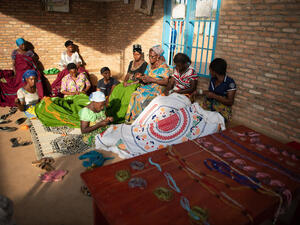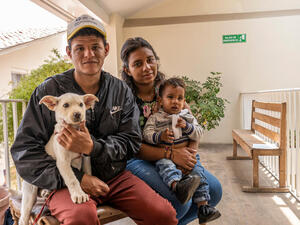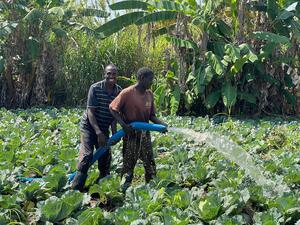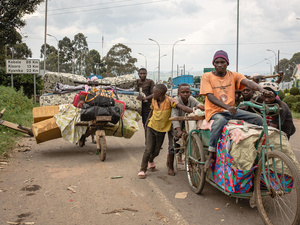Weaving for Change – A unique project helps Malian refugee women restore their lives
Weaving for Change – A unique project helps Malian refugee women restore their lives

Hadija, 27, is a mother of three and refugee from Mali, now living in Burkina Faso. In Mali, she used to weave traditional baskets for a living. "I left Tombouctou region when the conflict started. In 2012, I reached Amawal, in Burkina Faso, on the back of a donkey," she said. "I am not happy that I had to leave my home but at least here I have found peace".
Ouagadougou, Burkina Faso – Aichalala, 49, was a businesswoman before the outbreak of conflict in Mali in 2012. She used to travel between Côte d’Ivoire, Togo and Ghana, where she traded cattle and traditional fabric. “I dreamed of opening my own boutique in my homeland, a base from where I would conduct my business in West Africa,” she says nostalgically. The eruption of violence shattered that dream. “My husband lost his life in the chaos, escaping the violence. I literally left everything behind when I fled to Burkina.” Aichala now lives in Goudoubo refugee camp, where she has joined the Tuareg women weavers group.
“From the very start of the crisis in Mali, the UN Refugee Agency has been present to manage the massive influx of refugees in neighbouring countries, offering live-saving assistance,” says Gogo Hukportie, UNHCR Representative in Burkina Faso. “Today, as insecurity continues to cause new displacement within Mali and to neighbouring countries, and as conditions there are not conductive for return, UNHCR is working with its partners to support Malian refugees in becoming self-reliant and earn a decent income, while sustaining their artistic traditions.”
Hadija, 27, and a mother of three, also joined the women weavers group. Back in Mali, she wove traditional baskets for a living. “I left Tombouctou region when the conflict started. In 2012, I reached Amawal, in Burkina Faso, on the back of a donkey,” she said. “I am not happy that I had to leave my home, but at least here I have found peace.”
Aichala and Hadija, like other refugee artisans, have received training, resources and raw materials to help them craft their products and develop the skills to market them. “These refugees are talented, and they manage to create beautiful products despite the circumstances in which they have found themselves and the hardships they have faced,” highlights Ms Hukportie. “These products are well received abroad in the international market,” she says. “The success of the artisan project in Burkina Faso has inspired others who are eager to see refugees using their talents.”
Akosua Afriyie-Kumi, a young Ghanaian designer and creative director of her own brand, AAKS, has been training female weavers in a design workshop since November 2016. AAKS and the refugee weavers now work together, merging traditional weaving techniques and contemporary designs.
“The heritage and talents of Tuareg refugees hold a great potential,” says Akosua. “It appeals to consumers abroad who are seeking hand-made goods that are more meaningful and authentic,” she adds. Akosua has already trained ten women in a first workshop, and her goal is to have 100 trained weavers by the end of next year.
For Hadija, this experience is her first time being involved in a project. “I am proud of the work I deliver,” she says, showing a colourful hand-made lamp. “With the money I make, I can feed my family and cover our basic needs.”
Aichalala hopes the project will help her to become again the business women she was before fleeing. “When peace returns, I will go back to Mali and work on similar designs,” she says with a smile on her face. “I know customers in Abidjan’s Hôtel Ivoire will love my unusual baskets and lamps.”
“As a designer, merging my expertise with the talents of Tuareg weavers, and at the same time helping modernize their heritage and skills offers exciting prospects,” Akosua Afriyie-Kumi says. “It takes about six weeks to complete each product. We use straw, bronze, copper metals and yarns that are organically hand-dyed in Burkina Faso – a new step in the development of my brand.”
With the product line still under development, Akosua is very optimistic about the prototypes. “The process is very time-consuming, but that’s the beauty of the product?”
Fleeing violence and conflict in Northern Mali, 133,000 refugees are now in neighbouring countries. 24,000 of them live in Burkina Faso, in one of two camps in the Sahel Region, in the North of the country, or in nearby villages, where they gradually start rebuilding their lives.
For more information:
- In Ouagadougou: Marlies Cardoen, [email protected], +226 655 047 86
- In Dakar: Romain Desclous, [email protected], +221 77 786 396 385








